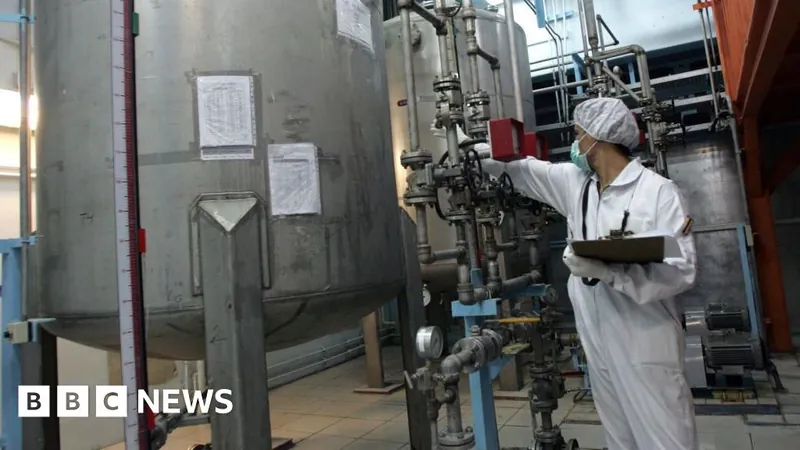
WHO Sounds Alarm on Dire Need for Innovative Treatments Against Deadly Fungal Infections
2025-04-04
Author: Benjamin
WHO Sounds Alarm on Dire Need for Innovative Treatments Against Deadly Fungal Infections
In a groundbreaking revelation this week, the World Health Organization (WHO) has unveiled two critical reports emphasizing the alarming lack of effective medications and diagnostic tests for treating and identifying invasive fungal infections, including the notorious Candida auris. These deficiencies are particularly concerning given the staggering statistic of over 6.5 million annual fungal infections leading to approximately 3.8 million deaths globally.
Dr. Yukiko Nakatani, WHO's interim assistant director-general for antimicrobial resistance, emphasized the gravity of the situation, stating, "Invasive fungal infections threaten the lives of the most vulnerable, but countries lack the treatments needed to save lives." She highlighted the severe gap in antifungal drug development, and revealed that even essential fungal testing is markedly insufficient in low- and middle-income countries, where many district hospitals are without adequate resources.
A Glimpse at New Antifungal Developments: Just Four in the Last Decade
According to WHO's report, in stark contrast to the rising threat of fungal infections, only four new antifungal drugs have gained approval from regulatory agencies in the United States, European Union, and China over the past ten years. These newly approved drugs target at least one of the four fungal critical priority pathogens linked to high mortality rates: Aspergillus fumigatus, Candida albicans, Candida auris, and Cryptococcus neoformans. Notably, only one of these drugs exhibits innovation qualities as defined by WHO.
While an additional nine antifungal drug candidates are in various phases of clinical trials—three in phase 3, two in phase 2, and four in phase 1—only seven demonstrate activity against at least one critical priority pathogen. Alarmingly, the compounded mortality rate from these pathogens can reach an appalling 88%.
Urgent Calls for Innovative Solutions
The report outlines major issues with existing antifungal therapies, including severe side effects, the risk of drug-drug interactions, and the necessity for extensive hospital stays. Moreover, it underscores the dire need for safer antifungal solutions, particularly for children, who are disproportionately affected due to a lack of focused clinical studies on pediatric dosing.
WHO is advocating for immediate investments in global surveillance, expanded financial incentives for drug research, and innovative approaches to targeting fungi, suggesting that treatments should also aim to enhance patients’ immune responses.
Diagnostics: A Major Gap in Fungal Disease Management
The companion report underscores an alarming gap in diagnostics—while some tests capable of detecting fungal critical priority pathogens exist, they are often out of reach for the populations most in need, especially in low and middle-income countries. Effective diagnostics require well-equipped labs and trained personnel, making them inaccessible for many.
Misinformation and a significant lack of awareness about fungal infections are additional hurdles healthcare workers face. Many medical professionals lack the necessary knowledge to accurately diagnose and treat invasive fungal infections, severely impacting patient outcomes. The WHO has committed to strengthening the global approach to combat invasive fungal diseases and antifungal resistance, backed by an implementation blueprint for its fungal priority pathogens list.
Conclusion: A Call to Arms Against Fungal Threats
The WHO's revelations serve as a critical wake-up call about the urgent need for enhanced investment in antifungal research and development. As the global fight against invasive fungal infections intensifies, it is clear that without innovative therapies and robust diagnostic tools, we risk losing countless lives to these deadly pathogens. The clock is ticking—action is imperative!









 Brasil (PT)
Brasil (PT)
 Canada (EN)
Canada (EN)
 Chile (ES)
Chile (ES)
 Česko (CS)
Česko (CS)
 대한민국 (KO)
대한민국 (KO)
 España (ES)
España (ES)
 France (FR)
France (FR)
 Hong Kong (EN)
Hong Kong (EN)
 Italia (IT)
Italia (IT)
 日本 (JA)
日本 (JA)
 Magyarország (HU)
Magyarország (HU)
 Norge (NO)
Norge (NO)
 Polska (PL)
Polska (PL)
 Schweiz (DE)
Schweiz (DE)
 Singapore (EN)
Singapore (EN)
 Sverige (SV)
Sverige (SV)
 Suomi (FI)
Suomi (FI)
 Türkiye (TR)
Türkiye (TR)
 الإمارات العربية المتحدة (AR)
الإمارات العربية المتحدة (AR)